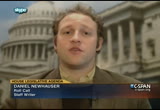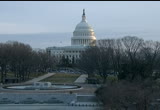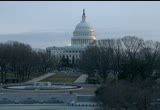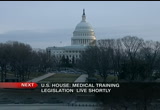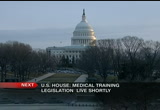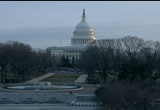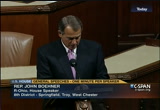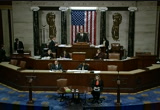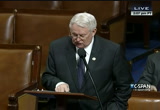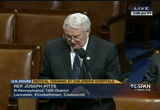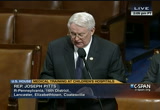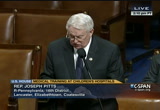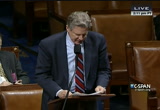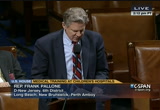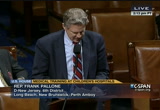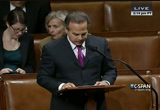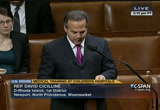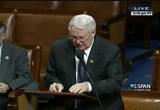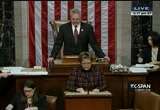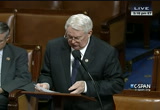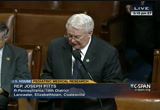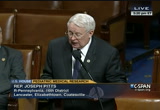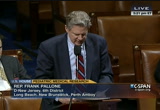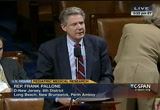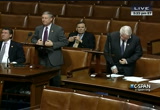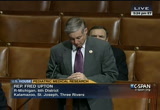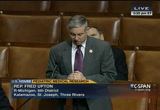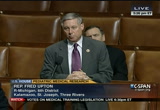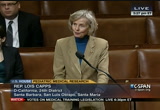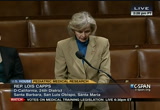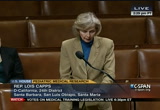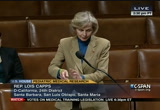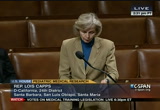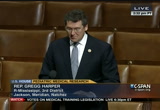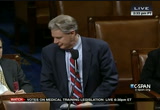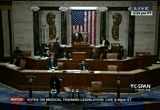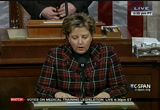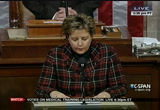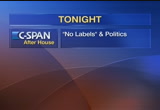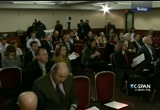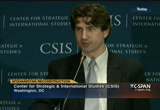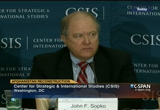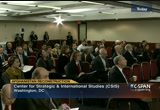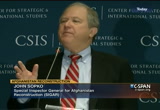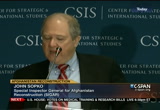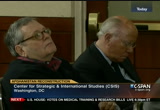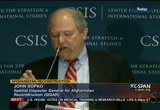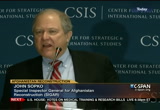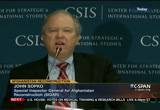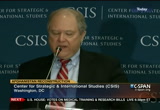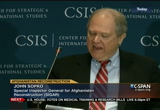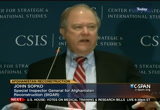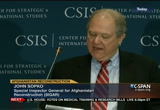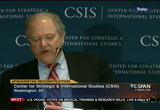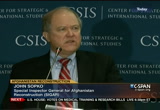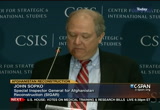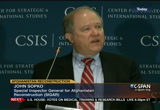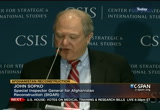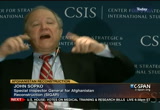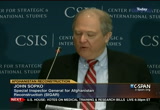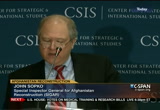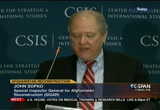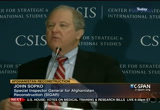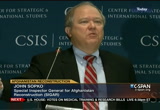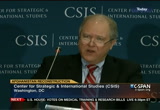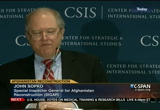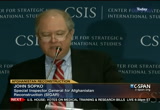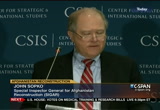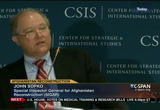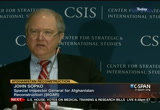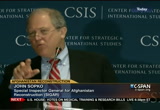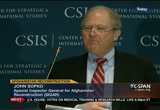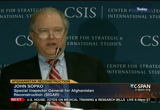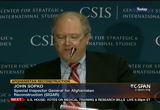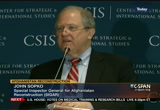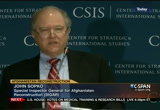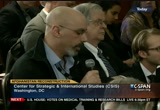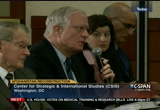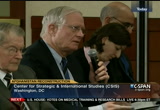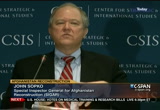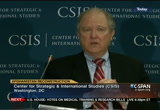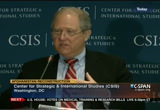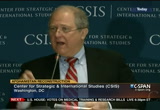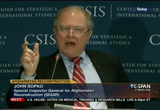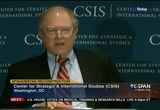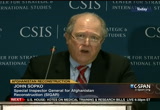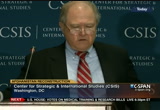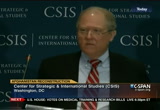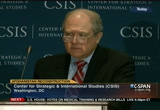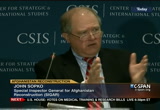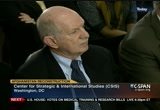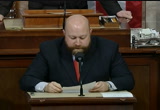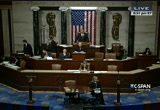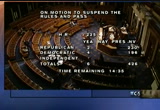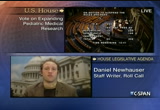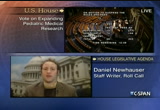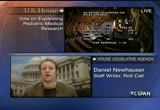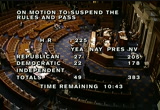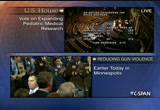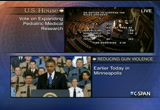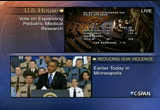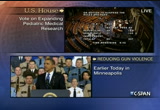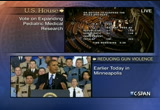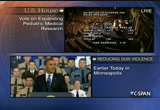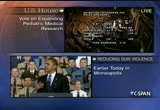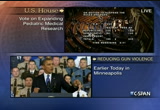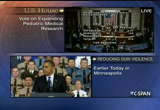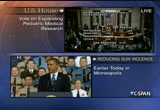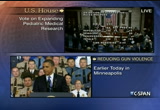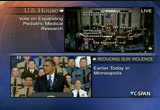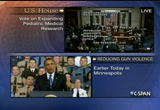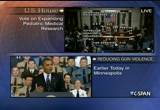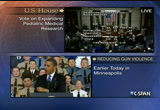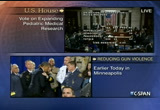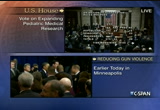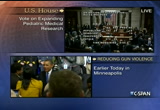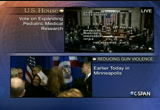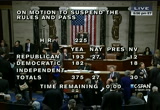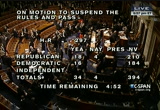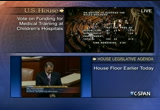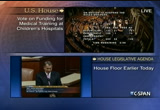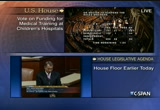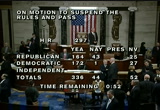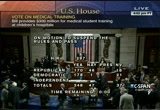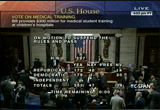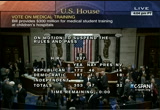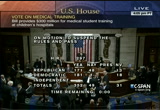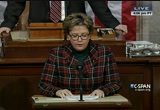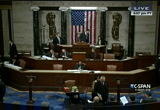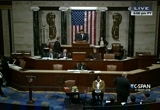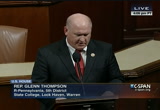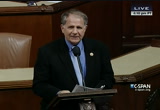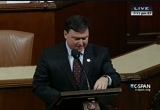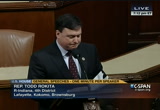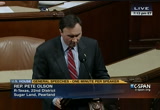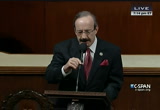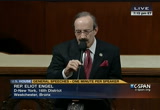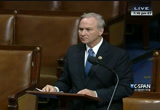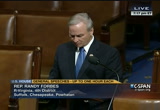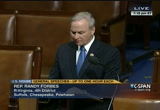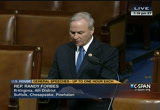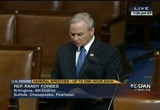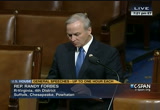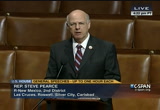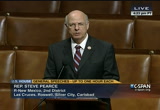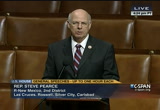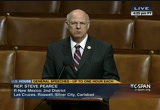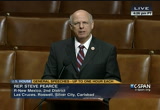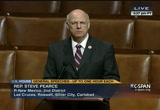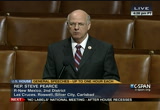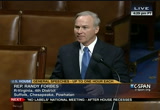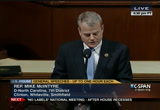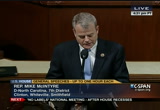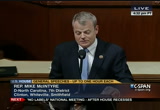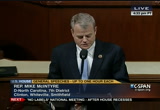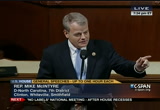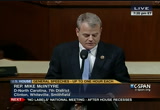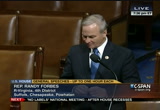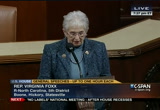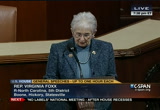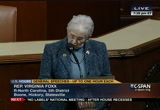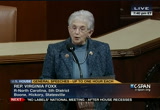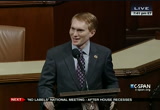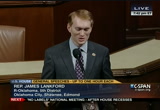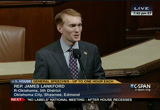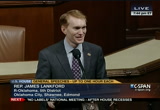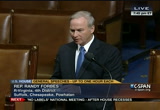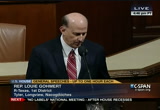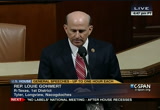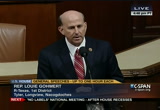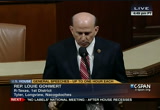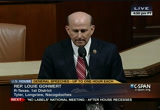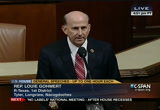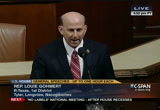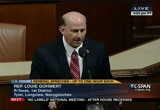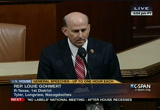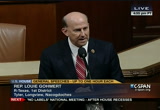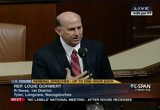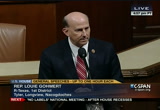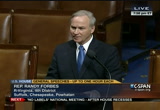tv Public Affairs CSPAN February 4, 2013 5:00pm-8:00pm EST
5:00 pm
5:03 pm
>> as we wait for the house little bit more information under bill coming up today. some numbers. providing a $300 million for medical student training at children hospital. that's one of the bills that will come up. another one provides $1 million in grants to states to train veterans as emergency medical technicians. the third bill allows national
5:04 pm
5:05 pm
about it. >> president obama missed a great opportunity today to help. our economy.this this was suppose to be the day the president submitted his budget to the congress. it not coming.ming it's going to be late. some reports say that it couldth be as long as a month late. i guess that's too bad. our economy could use some presidential leadership right now. on thursday the presidentsban disbanded his jobs council after a grand total of four meetingsyr in two years. as americans got to work on friday, they learned their economy still isn't creating enough jobs. the unemployment rate actually went up. now government spending does cause growth, as the president believes, we shouldn't be having these problems. then may be, it wouldn't be so disappointing that his budget is late. well, we are having trouble and a large part spending is the
5:06 pm
problem. it's what's chasing jobs overseas and causing muchture anxiety about our future. one example of something the president's budget could have addressed is his sequester. sequester as washington speak is automatic spending cuts. the president first proposed this sequester in 2011 and insisted that it be part of the debt limit agreement. now twice the house has passed legislation to replace the president's sequester with common sense reform that's will reduce spending and preserve and strengthen our safety net more future generations. >> john boehner comments on c-span.org. going live now to the house fort debate on three bills. jersey, each will control 20 minutes. the chair recognizes the gentleman from pennsylvania. pitt pitt mr. speaker, i -- mr. pittenger: mr. speaker, i yield myself --
5:07 pm
mr. pitt: mr. speaker, i yield myself such time as i may consume. pennsylvanians are fortunate to have excellent children's hospitals in the state. one of these hospitals is the children's hospital of philadelphia. the country's first hospital to exclusively care for children. and they remained one of the best for over 150 years. in a recent survey, the hospital was rated number one in six separate pediatric specialties and ranked no lower than fourth in another four special categories. other children around the country aren't so fortunate to have access to excellent doctors. a study in the journal of pediatrics found that more than eight million children have no pediatrician in their area. many other sick children have to drive hundreds of miles to see a doctor who specializes in treating their conditions. children aren't just miniature adults and treating them isn't just a matter of working on a smaller scale and shrinking the
5:08 pm
equipment. a doctor who is experienced in treating adults may not be able to apply that same expertise to a child. treating children is both a medical and an emotional challenge. often doctors have to correctly diagnose an illness in little patients who haven't even learned to speak. it takes a special person to go into pediatrics. for time -- for a time in the 1990's, our nation was facing an acute short and of pediatricians, with much of government assistance to train doctors being funneled through the medicare program, it was becoming significantly more expensive for a doctor to choose to be trained in pediatrics. to help correct this imbalance, congress created the children's hospital graduate medical education program. this is a program that was created and has been sustained with bipartisan support. unfortunately the program is facing elimination. president obama's budget for
5:09 pm
the 2012 fiscal year called for elimination of the program, despite the positive results. i support getting rid of programs that are duplicative, unproven or unnecessary. especially with the budget pressures we're facing now. however chgme has a proven track record. over 40% of pediatricians in the united states are trained through chgme. 43% of those in subspecialties are trained through the program. the children's hospital of philadelphia runs the largest pediatric residency in the country. the residents will treat children in my community and then move across the country to practice in other communities. we need their expertise now more than ever. last congress i worked with commy democratic counterpart on the -- my democrat counterpart to renew the program. our legislation passed the house of representatives twice in the 112th congress, both
5:10 pm
times by voice vote. unfortunately the bill was tied up in the senate and was not considered. congressman pallone and i waste nod time in reintroducing the bill this year -- wasted no time in reintroducing the bill this year and i'm proud to say that in the first meeting of the commerce committee in january 22 the bill was reported out unanimously. the bill is a very simple five-year re-authorization of the chgme program at current funding levels. h.r. 297 is supported by the children's hospital association, the american hospital association, the academic pediatric association, the american academy of pete yacht ricks, the american pediatric society, association of medical school department chairs, the society for pediatric research, the association of american medical colleges, the american osteopathic association and the american college of surgeons, among others. far too many children in our nation are already lacking access to a pediatrician.
5:11 pm
or a doctor trained in pediatric subspecialty. without chgme we will once again be discouraging medical residents from choosing pediatrics. on a personal note, nearly two years ago i met anna who was receiving treatment for leukemia at the children's hospital in philadelphia. today, thanks to the excellent care she received, she is happy, energetic and in school full time. she continues to remind me of what is really at stake. i urge my colleagues to vote yes on h.r. 297 and reserve the balance of my time. the speaker pro tempore: the gentleman reserves the balance of his time. the chair recognizes the gentleman from new jersey, mr. pallone. mr. pallone: thank you, mr. speaker. i yield myself such time as i may consume. the speaker pro tempore: the gentleman may proceed. mr. pallone: mr. speaker, i'm pleased to rise in support of h.r. 297, the children's hospital graduate medical education re-authorization act of twirt. as every parent knows it's very
5:12 pm
important to have a trusted doctor to turn to when their child gets sick. since its inception in 1999, the children's hospital graduate medical education program, known as chgme, has helped to make sure that doctors -- that the doctor is there and prepared to diagnose any symptoms that our children face. in fact, the program has been a true success. in the 1990's, declines in pediatric training programs threatened the stability of the pediatric work force and chgme helped to reverse these dangerous declines. even then congress, on a bipartisan way, recognized that if we didn't create and fund programs that would train doctors to tree treat these children, there wouldn't be anyone left to take care of them. that's why the house overwhelmingly supported re-eighthization of the program in the 112th congress, passing stand-alone legislation in september, 2011, and also including the re-authorization in broader legislation in december, 2012.
5:13 pm
children's hospitals can play a key role in ensuring the continued growth of our nation's pediatric work force. in 2009 the program supported the training of 5,361 resident physicians nationally. the program will also help to enhance hospitals' research capabilities and improve hospitals' ability to provide care to vulnerable and underserved children. re-authorizing chgme continues to be one of my top public priorities and i want to thank congressman pitt, the chairman of our health subcommittee, for working with me on this bill. together with his help and leadership we were able to move this bill again swiftly to our committee and to the floor upon convening this congress. mr. speaker, this program has proven results and it's past time we finally re-authorized chgme so we can provide certainty to hospitals, doctors and their patients. children and our communities are counting on this program to train a future generation of pediatricians and i urge my colleagues to vote yes on the bill. i reserve the balance of my time.
5:14 pm
the speaker pro tempore: the gentleman reserves the balance of his time. the chair recognizes the gentleman from pennsylvania. mr. pitt: mr. speaker, i move to suspend the rules and -- or to ask that all members may have five legislative days to revise and extend their remarks and insert extraneous material into the record. the speaker pro tempore: without objection, so ordered. mr. pitt: i reserve. the speaker pro tempore: the gentleman reserves the balance of his time. mr. pallone: i'd like to now yield to my colleague from rhode island, mr. cicilline, three minutes. the speaker pro tempore: the gentleman is recognized for three minutes. mr. cicilline: i thank the gentleman for yielding. the re-authorization of the children's hospital graduate medical education program is critically important and something we must do. but i rise today to express some frustration with the bill as presented. specifically that while our nation faces an acute need for additional health professionals trained in psychiatry, this re-authorization continues a glaring mental health parody failure within the children's
5:15 pm
hospital graduate medical education program. the failure to include children's psychiatric teaching hospitals in the program. because medicare classifies these hospitals as psychiatric hospitals rather than as children's hospitals, child psychiatric hospitals are ineligible to participate in chgme. this presents a particular burden to a spectacular pediatric hospital in my district, bradley hospital. i introduced the children's hospital education equity act which was designed to fix this oversight by simply expanding the definition of a children's hospital to cover a child psychiatric hospital. . i'm disappointed this is being considered under suspension of the rules as it prevents consideration of the amendments and improve the bill. our nation must fulfill its commitment to mental health party and access to child and
5:16 pm
adolescent mental health care. i intend to support the bill and look forward to working with my colleagues in both parties and both chambers to correct this serious inequity. i thank the gentleman and i yield back. the speaker pro tempore: the gentleman from pennsylvania. the gentleman reserves the balance of his time. the chair now recognizes the gentleman from new jersey. mr. pallone: i have no additional speakers. so i would be prepared to close. i yield back. the speaker pro tempore: the gentleman yields back the balance of his time. the gentleman yields back the balance of his time. the chair recognizes the gentleman from pennsylvania. mr. pitts: i urge the members to support this legislation. it has tremendous bipartisan support and with that, i yield back the balance of my time. the speaker pro tempore: the gentleman yields back the balance of his time. the question is will the house suspend the rules and pass the bill h.r. 297. those in favor say aye.
5:17 pm
those opposed, no. in the opinion of the chair, 2/3 of those -- the chair recognizes the gentleman from pennsylvania. mr. pitts: i ask for the yeas and nays. the speaker pro tempore: the yeas and nays are requested. all those in favor of taking this vote will rise and remain standing until counted. a sufficient number having arisen, yeas and nays are ordered. further proceedings on this motion will be postponed. for what purpose does the gentleman from pennsylvania rise? mr. pitts: mr. speaker, i move to suspend the rules and pass h.r. 225, the national pediatric research network act of 2013. the clerk: union calendar number 2, h.r. 225, a bill to amend title 4 of the public health service act to provide for a national pediatric research network including with respect to pediatric rare diseases or conditions. the speaker pro tempore:
5:18 pm
pursuant to the rule, the gentleman from pennsylvania, mr. pitts and the gentleman from new jersey, mr. pallone, each will control 20 minutes. mr. pitts: mr. speaker, i ask unanimous consent that all members may have five legislative days in which to revise and extend their remarks and insert extraneous materials. the speaker pro tempore: without objection, so ordered. mr. pitts: i yield myself such time as i may consume. i rise in support and i urge my colleagues to vote for h.r. 225, the national pediatric research network act of 2013. this will foster important research on diseases that affect children. the bill will allow the national institutes for health to establish a national research network comprised of pediatric research. according to n.i.h., there are between 6,000 and 7,000 diseases considered rare that affect 25 million to 30 million people.
5:19 pm
most of the 7,000 rare diseases are pediatric diseases and often genetic. sadly, there are insufficient therapies to treat diseases. this is a proven way to support pediatric applied research and to promote coordinated research activities that focus on translating research to practice. this will help improve care for children. as an example, it is important to note that this bill will address some devastating diseases, such as spinal muscular atrophy and kills more babies than any other disease. it is uncureable and fatal. h.r. 225 introduced by representative capps and representative mcmorris rogers amends the agget so the director of the n.i.h. to provide for the
5:20 pm
establishment of a national pediatric research network comprised of research consortium. it could provide basic support and train researchers. if they receive an award would be coordinated by a lead institution. no more than 20 pediatric consortia would receive awards. this would support resevere and distribute scientific findings and provide reports to the director of the n.i.h. and the commissioner of the food and drug administration. the bill would result in no new or increased budget authority, entitlement authority or tax expenditure or revenues nor does
5:21 pm
the bill contain any earmarks. i'm pleased to support this legislation. it is my hope that the national pediatric research network i will -- improve therapies and better outcomes for our nation's children and i urge my colleagues to vote in favor of h.r. 225 and i reserve. the speaker pro tempore: the gentleman reserves the balance of his time. the chair recognizes the gentleman from new jersey, mr. pallone. mr. pallone: i yield myself such time as i may consume. mr. speaker, i rise in strong support of h.r. 225, the national pediatric research network act and commend my colleagues for their bipartisan efforts to move this legislation forward. there are many rare pediatric diseases and the children are incredibly fragile. if we can allow research to occur across the country, not just one single location, research can be done at a larger
5:22 pm
level because children could participate without having to travel. this bill would allow the national institutes of health to establish a national pediatric research network comprised up to 20 consortia, groups collaborating institutions and will will conduct research on pediatric diseases and condition. the n.i.h. director is directed to ensure that an appropriate number of awards go to consortia that focus on rare diseases and birth defects. in addition we know too well that pediatric research has been underfunded. that could make it harder to address these devastating illnesses. they can be the training grounds for future researchers helping to fulfill the pediatric pipeline. no funds are specifically
5:23 pm
allocated but it's our hope and expectation that n.i.h. will create the network and build on the important pediatric research that it already supports. in the last congress, it was already approved in the house energy and commerce committee and included in a broader children's health bill but has failed to be considered in the senate. i urge my colleagues to support this bipartisan effort to address pediatric research and with that strong support it's my hope we can encourage its passage in the senate this time. i reserve the balance of my time. the speaker pro tempore: the gentleman reserves the balance of his time. the chair recognizes the gentleman from pennsylvania. pitespites i yield such time to the chairman of the full committee, mr. up ton, the gentleman from michigan. mr. upton: this legislation, h.r. 225, the national pediatric research network act of 2013
5:24 pm
indeed brings us a step closer to helping kids with unmet health needs, especially those with rare pediatric and genetic diseases. according to the n.i.h. there are more than 6,800 rare diseases and most of them have no treatment or cure and yes, they primarily affect children. i met a number of times with one family in my district, the kennedys who have two precious little girls and i call them sleeping beauty and cinderella and have spinal muscular atrophy and they are great kids and they are making our research network a reality. it's so difficult to conduct research into these diseases due to the small number of people with that disease, tonight, we are working to provide families
5:25 pm
like the kennedys with greater hope for a cure and advances in treatment. this bill is going to support and coordinate research on pair pediatric and genetic diseases and help improve the health and well-being of these kids afflicted with these diseases. this bill establishes a national pediatric research network comprised of consortia. this consortia is a way to improve the gap in research and include leading institutions that act as partners to coordinate research efforts. they can promote efficiency and collaboration which is important where a disease impacts just a small number of kids. this bill is in essence the same bill as h.r. 6163 of the last congress, which passed in september and was part of s. 1440 in 2012. and last month in january, our
5:26 pm
committee, the energy and commerce committee passed this legislation on a very broad bipartisan voice vote. i want to particularly commend the author of the legislation, representative capps and representative mcmorris rogers, joe pitts as well, mr. waxman and others. this is a bill that all of us should support and i would urge my colleagues to do the same thing. it was unfortunate that last year, it took the house a little while to pass this and in the last days of the session, we couldn't get the senate to move. this year, there is a reason why this is one of the first bills to pass in the house, give the senate the time to get this thing done and get it to the president's desk to have him sign it into law, so he can help not only the kennedys in my district, but the kennedys literally in every district and
5:27 pm
so many kids that deserve our help. we can make a difference tonight, and we will when we pass this on a bipartisan vote and i thank those members and staff particularly for getting to this -- this to the floor in a timely fashion. and i yield back to mr. pitts. the speaker pro tempore: the gentleman from new jersey, mr. pallone. mr. pallone: i yield four minutes to the sponsor of the legislation, the gentlewoman from california, mrs. capps. the speaker pro tempore: the gentlelady is recognized. mrs. capps: i rise in strong support of h.r. 225, the national pediatric research network act and i associate myself with the remarks of our committee chairman, mr. upton, he has a family dear to his heart and they reflect families across this country for whom this bill will provide a glimmer of hope for the future. this is a bipartisan bill.
5:28 pm
it i will improve research and clinical trials on pediatric diseases and train future researchers and december imnature research findings quickly. it does not replacement our pediatric investments but builds upon the work already being done at the national institutes of health and at so many research centers across the country by creating consortia to form a network of pediatric researchers. this is important to make sure we are working with the current science and this information is quickly shared and verified. this bill will expand the geographic scope of research giving sick kids easy access and will help a wider variety of institutions participating in this clinical research by providing training grounds for our next generation of pediatric researchers. another key feature of this bill it will place an added emphasis
5:29 pm
on researching children's rare diseases and develop new treatment to fight them. my colleagues have heard me talk before about diseases just referenced by our committee chair. this doesn't just affect a sick child but fundamentally changes the daily lives of their family, their school, their community. the low prevalence of such diseases makes them hard to research, but for those affected, a new cure or treatment could mean a world of difference. the national pediatric research network act will be an important step to help those families along into the future. i'm a nurse, mother and grandmother as well and i'm very pleased to have authored this bill that will help bring more treatments and cures to many children. children have unique health care experiences, treatment needs, research challenges and while public and private research has
5:30 pm
come a very long way on pediatric diseases over the years, we are still behind on important cures and treatments for far too many of our ailing children which is why this bill is so important. i thank cathy mcmorris rogers for co-authoring this bill with me and all her hard work and i thank the leadership of the energy and commerce committee, chairman upton and ranking member waxman, chairman pitts, ranking member pallone for their dedication to this bill and to their staffs especially, ruth, for making this bill move through the committee quickly. and i finally would like to thank my constituents. i'm wearing a particular bracelet. for bill and victoria strong for their tireless work on behalf of their work. the bracelet reads never give
5:31 pm
up. gwen, who was once thought would not live past age two is now in kindergarten. the work her parents bill and victoria do day in and day out is so inspiring. the dedication of their parents and the medical team allows chair their child to live life to the fullest and communities can come together and fight diseases like s.m.a. come together and support this bill today so we can do to make it law. the national pediatric network research act is an important bill for sick children, for their families. it's a bipartisan measure that received overwhelming support in the 112th congress and right thing to do and i urge full support and i yield back. the speaker pro tempore: the gentlewoman's time has expired. the chair recognizes the
5:32 pm
gentleman from pennsylvania. mr. pitts: i yield two minutes to the gentleman from mississippi, mr. parker. . park park this bill -- mr. parker: this bill identifies and promotes therapies to for rare childhood diseases. one of the disorders that this proposal targets is spinal muscular astroify or s.m.a., which is the number one genetic killer of children under the age of 2. this often unfor giving neurological disease leaves children weak and unable to move, breathe, swallow or talk. but research is promising and a cure is close. mr. harper: recently a friend of mine, jeff horton, from my home county of mississippi, shared with my office that his daughter, edie, who had s.m.a., had an encouraging visit with an s.m.a. specialist in dallas. you see, edie has toured the
5:33 pm
country meeting with experts devoted to advancing new and innovative s.m.a. therapies. as a result, edie's quality of life continues to improve as she gains mobility and a sense of independence. i urge you today to please support this legislation for edie and others such as her cousin, reece, and the many other families that are affected by rare childhood diseases. this is something that we can do and that we should do. i thank you, mr. speaker, and i yield back the balance of my time. the speaker pro tempore: the gentleman yields back the balance of his time. the chair now recognizes the gentleman from new jersey. mr. pallone: mr. speaker, i have no additional speakers so at this point i would urge passage of the legislation and i yield back the balance of my time. the speaker pro tempore: the gentleman yields back the balance of his time. the gentleman from pennsylvania. mr. pitts: mr. speaker, i'd like to include in the record c.b.o.'s cost estimate for h.r. 225. the cost estimate was not available when the committee
5:34 pm
filed its report on the bill. the speaker pro tempore: without objection, so ordered. mr. pitts: mr. speaker, i urge all members to support this important legislation and with that i yield back the balance of my time. the speaker pro tempore: the gentleman yields back the balance of his time. the question is will the house suspend the rules and pass the bill h.r. 225. those in favor say aye. those opposed, no. in the opinion of the chair, 2/3 of those voting having responded in the affirmative -- mr. pitts: mr. speaker. the speaker pro tempore: the gentleman from pennsylvania. mr. pitts: i ask for the yeas and nays. the speaker pro tempore: the yeas and nays are requested. all those in favor of taking this vote by the yeas and nays will rise and remain standing until counted. a sufficient number having arisen, the yeas and nays are ordered. pursuant to clause 8 of rule 20, further proceedings on this motion will be postponed. the chair lays before the house a message. the clerk: to the congress of the united states, section 202-d of the national emergency
5:35 pm
act, 50, u.s.c., 1622-d provides for the automatic termination of a national emergency unless within 90 days prior to the anniversary date of its declaration the president publishes in the federal register and transmits to the congress a notice stating that the emergency is to continue in effect beyond the anniversary date. in accordance with this provision, i have sent to the federal register for publication the enclosed notice. stating that the national emergency declared in executive order 13396 of february 7, 2006, with respect to the situation in or in relation to coat defor, is to continue in effect beyond february 7, 2013. the situation in or in relation , which has been addressed by the united nations security council and resolution 1572 of november 15, 2004, and subsequent resolutions has resulted in the massacre of
5:36 pm
large numbers of civilians, widespread human rights abuses, significant political violence and unrest, and fatal attacks against international peacekeeping forces since the inauguration of the president in may of 2011. the government has made progress in preventing democratic freedoms and economic development. while the government and its people continue to make progress toward peace and prosperity, the situation in or in relation to the country continues to pose an unusual and extraordinary threat to the national security and foreign policy of the united states. for these reasons, i have determined that it is necessary to continue the national emergency and related measures blocking the property of certain persons contributing to the conflict. signed, barack obama, the white house, february 4, 2013. the speaker pro tempore: referred to the committee on foreign affairs and ordered
5:37 pm
5:38 pm
commutetors the ahead community -- special inspector general for afghanistan says the u.s. spent more than $50 billion to help build a afghan national security force. he said the u.s. is missing key information about the force. he spoke to the center of strategic and international study. >> welcome. it is my pleasure today to be hosting john sofco who is the special inspector general for the afghanistan construct. he has been a state and federal prosecutor. he has been congressional
5:39 pm
council, senior government advisor. he has been the chief council for oversight and investigations for the house committee on energy and commerce. has also been on chief overseek council at the homeland security. under then senator sam nun, he was on the senate subcommittee for investigation state. he has worked at commerce at the justice department and at the state and federal level. today, he is the special inspector general for afghanistan's restructure. we are entering our 12th year in that conflict. i wish that i can report that reconstruction is complete. unfortunately, we do know compared to ten years ago, there has been a great of deal in
5:40 pm
afghanistan's society and its quality of government. we're all very well aware the reconstruction program has not always gone desired as expected. we have military units continuing to rotate into afghanistan today. we still have many tens of thousands of troops on the ground and we have what is expected to be now, a more rapid troop drawdown from afghanistan over the next two years. then i think any of our military planners and reconstruction officials had hoped for or expected. he's recently turned from a trip in afghanistan and published the first quarterly report of 2013. we look forward to hearing what he has been finding in afghanistan and what his views are on the future of the
5:41 pm
reconstruction program in afghanistan. >> thank you very much bob. it's pleasure to be here and i have to apologize to start with. for those of you have been in afghanistan, you forget what's called the cobble crud. particularly in winter. i will be trying to speak through that today. it is a real honor to be here today at csis in many ways it's a bit of homecoming. i see some old friends of fine, judge webster, arnold back there. i worked for over 15 years for sam nun who has bob mentioned is the chairman of the csis board of trustees as well as john for quiet a few years when he was
5:42 pm
working for sam nun. it is a bit of homecoming. in many ways, those 15 years that i spent with sam nun helped prepare me for my current job. from there i saw firsthand what congressional over sight can do to improve programs and policies of the united states government. this was later reinforced when i had the great opportunity to work with who i think many people have viewed as probably the father of modern congressional over sight and that was chairman ron dingily and ran his investigations for a number of years. both of them, i also learned the important role of an independent and aggressive inspector. because the statute in 1978 was inspector general who basically told the truth and power.
5:43 pm
both of these men, sam nun and john dingle understood the roles of inspector and improving the operations of the united states government. those two men have brought me to where i am today. it has been only seven months, however, since i was appointed by president obama as special inspector general for afghan reconstruction. since then i traveled twice to afghanistan. i've spoken to all the major players both in and out of the government as well as many of our nations top policy makers and prestigious think tank experts including many right here at csis in the audience. i learned a lot about our government effort there, what we accomplished and what we haven't as well as the many challenges that still face us in that country. i've also spent a great deal of time thinking about what my
5:44 pm
agency role at sigar in afghanistan. let me take a few minutes about sigar. it's not a well known organization. special inspector general of afghan reconstruction, it is the only agency in the entire united states government who's mission reconstruction in afghanistan. nothing else. we're unique about that. we have unique authority to examine any project by any government agency operating in afghanistan dealing with reconstruction. we can look at the department of defense, department of state, a.i.d., department of justice. any agency rating in afghanistan. that's unique 37 37. -- we have the largest over sight present in afghanistan. we have the most successful record of working with afghan
5:45 pm
law enforcement in prosecuting, arresting and prosecuting individuals in afghan courts. we are temporary agency. we go out of existence. we sun set when reconstruction drops below $250 million in unexpended funds. we're in the billions now. accordingly, we have very unique hiring contract authorities, unique to the government. that allow us to get the best people as quickly as we can for what i think is the most dangerous over sight job in the united states government. when congress created sigar in 2008, it also gave us the responsibility and the authority in the statute to lead, coordinate and recommend policies to improve the afghan reconstruction effort. accordingly, i believe it is our job to evaluate the bigger picture and offer direction as
5:46 pm
necessary and appropriate on the reconstruction effort. just last wednesday, bob eluded to the fact that i returned from afghanistan. i tried to visit afghanistan every quarter. every one there i can assure you, in the embassy and military is intensely focused on the difficult task of transferring security responsibilities to the afghans by the end of 2014. and equally, interested in concerned about strengthening the afghan government's ability to manage the country's continued reconstruction efforts during this transition period and beyond. i think it is fair to say that the success or failure of our entire investment in afghanistan is teetering on whether these two interrelated and ambitious goals can be met.
5:47 pm
i have little doubt, especially from speaking to all of the major leaders that the men and women responsible for taking on this challenge are acutely aware of that situation. likewise, the newly installed 113th congress have the responsibility to ensure that the next stage of our nearly $100 billion decade-long reconstruction effort is properly directed towards those activities and projects that will have the greatest opportunity of long term success. in light of my role as special inspector general and unique mission and mandate, today i want to pose to you, a set of seven fundamental questions that i believe need to be asked of every ongoing and planned reconstruction project by both congress and the executive branch in order to ensure their success and ultimate success of our mission in afghanistan.
5:48 pm
the first question is does that project or program make a clear and identifiable contribution to our national interests or strategic objectives? the second question is, do the afghans want those programs or projects and do they need those programs and projects? the third question is have those programs or projects been coordinated with our allies, with the afghans and in internally with our own government? fourth question we must ask, is do security conditions permit effective implementation and over sight of those projects and programs? fifth question is, do those programs and projects have adequate safeguards to detect, deter and mitigate against corruption which is endemic in
5:49 pm
afghanistan. sixth yes we need to ask, do the afghans have the financial resources, the technical capability and political will to take those programs and sustain them in the next decade ahead? lastly, i have the implementing agencies established meaningful, measurable metrics for determining success and are they applying them to their own programs? to many of you in the audience, these questions seem simple. in fact, they are. but unfortunately, what we have found in our work and what the other inspector generals have found in their work is that they are often ignored by those designing and implementing our reconstruction programs. i like to take some time and the rest of the speech to explain why i think these questions are
5:50 pm
important, discuss what our work and the work of the iegs are doing about them. let's look at that first question. do the projects and programs make a clear and identifiable contribution to our national interests or strategic objectives? as you are well aware, the united states primary goal in afghanistan has been to prevent afghanistan from becoming once again, a safe haven for al qaeda or other terrorist groups to launch attacks against the united states and its allies. our central tenant of the u.s. campaign to achieve this goal to be counterinsurgency. however, our work has found instances in which reconstruction program have failed to achieve this intended benefit and in some cases have
5:51 pm
actually resulted in adverse effects. in april of last year, for example, we released audit report on the local governance and community development program or l.g.c.d. program. which u.s. agency for international development touted the flag ship coin program. the primary goal of that program was to create in partnership with the afghan government a stable environment for long term political economic and social development. however, as we reported, that the program had not met its primary goal of extending legitimacy of afghan government, nor has it brought the government closer to the people. in fact, my auditors found each the eight progresses experiences
5:52 pm
dramatic increases in the level of violence between 2006 and 2010. although the effects of the lgcd program on security level cannot be isolated, violence data useful indicator stability. this date certainly suggested that the program was not achieving its intended goals. likewise, in july of last year, we issued a report on the afghan infrastructure program or a.i.p. which congress created resources for large scale infrastructure projects in afghanistan. we found that five of the seven fiscal year 2011 projects were behind schedule. some of these projects may not achieve the positive coin effects for several years if at all. we also identified some instances where the projects resulted in the adverse effects. because they either created an
5:53 pm
expectation gap or lagged citizen support. sigar intends to conduct more assessments to support the coin strategy. including an audit we will initiate soon on the stabilization in key area program. which is $177 million community development program. likewise, sigar intends to increase its focus in the next year on that second question that should be asked each reconstruction project. this is do the afghans want it and do they need it? you'd be surprised how often we find that the answer to this question is no. let me give you an example, few days ago, we released an inspection report on $7.3 million border police facility. when our inspectors went to visit the site, they found that
5:54 pm
it was sitting unused. although the facility was built for 175 troops, the troopers, there was only 12 afghan personnel on site and no one was sure among them whether the site was going to be used. moreover our inspectors couldn't access most of the buildings because they were locked and the border police personnel present did not have keys. that is a bit of good news. as a result of our inspection, the combined security transition command which was responsible for these projects, agreed with our recommendations to reassess its plans and determine whether construction contractses can be downsized. i think this is a great example of how our work with lead to tangible improvements. i am especially pleased with the continued cooperation of general bulger and his team in
5:55 pm
attempting to improve cstika's effort. let me turn to another troubling problem. that is has the program or project been coordinated with other u.s. implementing agencies with the afghan government and with other international donors? the board of police facility i just mentioned is certainly an example of poor coordination with the afghan government. but elet me -- let me give you an example of poor coordination within the u.s. government. in 2011, sigar conducted a thorough assessment. we found even though the department of defense and department of homeland security working with the same afghan banks, neither agency was aware of the other's efforts.
5:56 pm
in addition, the department of homeland security had not been included in important interagency working groups designed to coordinate efforts, to gain vizment over cash -- visibility over cash flow. the next question i posed is particularly important for sigar because it impacts us almost as much as it impacts the agency implementing reconstruction. that is whether security conditions permit effective implementation and over sight. the withdrawal of u.s. troops is well under way. u.s. and coalition forces already pulled out a number of locations in afghanistan. leaving some of those places too dangerous for us or the
5:57 pm
implementing agencies to visit. some of you may have heard of what's a term called the golden hour. this refers to the policy unique to only u.s. forces and only in afghanistan which in essence says that the military will only provide security in areas within an hour of a policy that can provide emergency medical care. the safe zone or bubble, around those medical facilities extend about as far as 20 minute helicopter ride. as the troops continue to withdraw, the amount of territory inside afghanistan that falls outside these bubbles will increase. accordingly, the number of u.s. funded projects and programs that can be monitored and over seen by u.s. personnel will
5:58 pm
decrease. if we can't get out to review a project or inspect a facility, it is highly unlikely that the agencies funding them can do either. whether it's an agency of the department of state, department of defense, a.i.d., department of justice, department of agriculture. any other u.s. agencies operating in afghanistan. this means that more reconstruction projects exists with no direct u.s. over sight. we have already seen the effect of security limitations on the reconstruction effort as well as on our own operation and that of our colleagues and the over sight and law enforcement community. for example, we reported in 2011 that the world bank had not conducted site visits outside of kabul to monitor the activities funded by the multibillion dollar afghanistan reconstruction trust fund because of security concerns.
5:59 pm
security restrictions are not limited just to the world bank. just recently one of my inspection teams was told that a location in northern afghanistan was beyond the gold be hour, beyond the security bubble and therefore deemed too unsafe to visit. as a result, we are unable right now to inspect 38 facilities worth approximately $72 million. i want to take this opportunity to personally thank the operations and under the command of colonel j.r. bash who will task force, has done wonderful work supporting us and not only northern afghanistan but elsewhere in the country. even they are limited by the security bubble. even in kabul, we're finding we cannot always get the protection we need to conduct our work. kabul is clearly within the
6:00 pm
6:01 pm
homicide of two u.s. personnel. we are developing alternative ways to conduct oversight in afghanistan, involving the security environment. nationals on our staff and not subject to the same security restrictions that american employees are. in some cases, we may have to we're also exploring the use of geo-space imaging. these efforts are helpful, but not preferred. the gold and standard on u.s. oversight is an employee trained to do u.s. oversight going out there inspected the
6:02 pm
site, inspect and the records, kicking the tires. unfortunately, we may not be able to do that for very much longer in afghanistan. i am particularly grateful to ambassador cunningham and general allen for their continued expressions of support for our work. both promise to me during my latest visit that they would ensure that our people would be able to access the same locations that their people can access. but ultimately, you can see that the question is, how far will their people be able to access? what will they be able to see? how far will they be able to go
6:03 pm
outside the kabul bubble? many of our programs will be exposed to increased risk, and misused, especially as we continue to use direct or on- budget assistance to the afghan red, and especially if we do so without opposing preconditions on the afghan government for effective personnel. the next question i posed deals with an equally significant problem, namely, corruption. are the reconstruction projects developed and planned to include adequate safeguards to detect, deter, and mitigates corruption? afghanistan's reputation for corruption is deep-rooted and widespread. i do not have to devote too much time to that. a recent survey found that 60% of the afghans believe that
6:04 pm
corruption is a major problem, and even more believe that it is a major problem on the national level. an example of some of the work we had dealing with corruption was one that our office of special projects recently the afghan government has refused to use them. even worse, those identified by the afghan jimenez voip's, or in some cases, the vip's allowed to travel freely through the airport, raising the risk of money laundering and other corruption. afghanistan has made commitments to curb corruption.
6:05 pm
the july, 2012 donor's conference in tokyo led to a set of mutually agreed to principles that included incentives for theunfortunately, we are concerned and not enough is being done quickly enough on these principles, particularly developing specific benchmarks. it has been almost eight months since this landmark agreement, and we still have not seen anyif not now, when will we see them. i can tell you that as a result of my latest trip to
6:06 pm
afghanistan, i will shortly be american taxpayer need to see combat corruption and improveif this is not done immediately, i fear we risk the loss of u.s. and international donor support for on going we construction. corruption can also undermine the sustainability of reconstruction programs. a key concern for the u.s. and other international donors. this leads me to another in a series of questions. do the afghans have financial resources, a technical capacity and the political will to sustain the programs we are
6:07 pm
turning over to them? examples of which the u.s. created a program or build the facility without consideration as to whether the afghan province. as a result, many projects have become dilapidated or were in disrepair, including a number of projects completed under the commanders emergency response program, or cerp. in regard to the program, we were particularly troubled by some statements that senior officials had told us, that they did little more than check
6:08 pm
a box in the cerp project files to indicate that the afghan government agreed to fund and sustain those programs. the result is a waste of u.s. taxpayer money. by building infrastructure or developing programs that the afghans will never effectively used. in how many teachers day of trade, how many schools built,
6:09 pm
how many kilometers of road they have built, how many culverts they have built, but not on what the result is. is there any result from doing these metra give us a part of the picture, but they do not capacity of the afghan ministry of agriculture to better serve farmers and promote privatethe u.s. embassy could not determine how much progress had been made from the project because all they had done was measure the products of capacity building efforts, such as the number of research stations it had built. a number of stations that have
6:10 pm
been rebuilt. the number of labs that had been built or rebuilt. rather than the results that construction. american taxpayer needs to know what the u.s. reconstruction money spent in afghanistan? in sum, those are the seven simple, but we think critical, questions. to the extent that agencies can answer in the affirmative to them, we believe that a project
6:11 pm
or program has a better chance of achieving real success. as in the case of the afghan and agency's spending reconstruction dollars fine said the answer to these very basic questions is init is time for them to reevaluate continuing ori particularly pose these questions in the quarterly report we issued last week. we are troubled now. we have been told that some of the agency's operating in afghanistan may be poised to obligate as much money as theyif
6:12 pm
this happens with our first assuring every answer those questions in the affirmative, we the congress to also keep these questions in mind as they review new authorization and appropriations. and as i mentioned, congress needs to assure itself that the appropriated, but not yet obligated, not yet spent, will only be spent if they have these seven requirements. obviously, we recognize that there may be projects that do not meet any or all of these seven questions. they still need to be funded.
6:13 pm
for doing so. and congress needs to will those agencies accountable to that explanation for why they took the risk. in conclusion, we are about to embark on a dramatic drop down to turn over to the afghan government an unprecedented amount of buildings, projects, with the hope that they can manage them effectively. i believe that strong and independent oversight needs to
6:14 pm
be an essential component of such a withdrawal plans. we construction activities are success. actually, as our own military role recede, the next two years and beyond, what some call the really be the decade of reconstruction. therefore, congress and the executive branch need to conduct a thorough re- examination of a construction issues, programs, and projects. we are committed to the success [applause] >> thank you very much. i am sure there are many
6:15 pm
questions in the audience. wait for the microphone. the we are live streaming and your question will not be heard if you are not at a microphone. please, identify yourself and make sure you pose a brief question rather than give a speech. like to leave enough like -- enough time for mr. sopko to answer them. time. >> thanks for the top.
6:16 pm
u.s., and it would be difficult to get an affirmative response on all of those seven for any of the projects that we do. are intangible benefits that do not demonstrate a clear metrics on the back and they allow for building and for access for u.s. forces. counterinsurgency effort. how does that affect your inspection efforts? i wonder why the focus on programs, without looking at plans, when for example the aid
6:17 pm
flow will be cut from $4.6 the programs right. if you do not have a plan -- and similarly, when you looked at your transition plan in your own report, there is no plan. there is simply transition. it is not tracked to the nsf. effectiveness. issued. the fact is, a lot of the measures we are using do not really make any sense, like good
6:18 pm
to have measures of the first question. and then i will get to the multi part question. on the intangible benefits, yes, we do recognize there are some. but what i was trying to say benefits for a program or policy, they should be articulated. we should find out after we go into the audit. i recall an instance where we
6:19 pm
6:20 pm
6:21 pm
6:22 pm
6:23 pm
6:24 pm
6:25 pm
6:26 pm
but the second one says, if they without significant coalition assistance, and that affects many of the entities within thehave you looked at the downward trend in isaf and u.s. forces, which is providing benefits assistance? and as you move toward 2014, unable to accomplish their here. >> i returned from afghanistan a few weeks ago. affiliation.
6:27 pm
6:28 pm
6:29 pm
6:30 pm
the numbers. where do they get the numbers of deserted, and so forth. if you do not have security, the question about reconstruction accomplish your goal. one question is, and actually the penultimate question is concurrent resolution and ask for its immediate consideration in the house. the speaker pro tempore: the clerk will report the concurrence resolution. the clerk: house concurrent resolution 11, resolved that the two houses of congress assemble in the halls of the
6:31 pm
house of representatives on february 12, 2013, for the purpose of receiving such communication as the president of the united states shall be pleased to make to them. the speaker pro tempore: without objection, the resolution is agreed to and the motion to reconsider is laid on the table. pursuant to clause 8 of rule 20, proceedings will resume on motions to suspend the rules previously postponed. votes will be taken in the following order. h.r. 225 by the yeas and nays and h.r. 297 by the yeas and nays. the first electronic vote will be conducted as a 5-minute vote. remaining electronic votes will be conducted as five-minute votes. the fun finished business is the motion by the gentleman from pennsylvania, mr. pitt, to pass h.r. 225 as ordered. the clerk will report the title of the bill. the clerk: h.r. 225, a bill to amend title 4 of the public health service act to provide
6:32 pm
for a national pediatric research network including with respect to pediatric rare diseases or conditions. the speaker pro tempore: the question is, will the house suspend the rules and pass the bill? members will record their votes by electronic device. this is a 15-minute vote. [captioning made possible by nba digital]
6:33 pm
6:56 pm
6:57 pm
on the motion of the the gentleman from pennsylvania, mr. pitts, to suspend the rules and pass h.r. 297, on which yeas and nays are ordered. the clerk will report the title of the bill. the clerk: union calendar number one, h.r. 297, a bill to amend the public health service act to reauthorize support for graduate educational medical programs in children's hospitals. the speaker pro tempore: members will record their votes by electronic device. , this is a five-minute vote. [captioning made possible by the national captioning institute, inc., in cooperation with the united states house of representatives. any use of the closed-captioned coverage of the house proceedings for political or commercial purposes is expressly prohibited by the u.s. house of representatives.]
7:06 pm
the speaker pro tempore: on this vote, the yeas are 352, the nays are 50. 2/3 being in the affirmative, the rules are suspended and the bill is passed. without objection, the motion to reconsider is laid on the table. for what purpose does the gentleman from georgia rise? >> i send to the desk a privilege red port from the committee on rules for filing under the rule. the speaker pro tempore: the clerk will report the title. the clerk: report to accompany house resolution 48, resolution providing for consideration of the bill h.r. 444, to require that if the president's fiscal year 2014 budget does not achieve balance in a fiscal
7:07 pm
7:08 pm
the house will be in order. the house will be in order. please take conversations to the cloakroom, please. the house will be in order. the chair will entertain requests for one-minute speeches. for what purpose does the gentleman from pennsylvania seek recognition? >> mr. speaker, i request unanimous consent to address the house for one minute and revise and extend. the speaker pro tempore: without objection the gentleman is recognized for one minute.
7:09 pm
mr. thompson: mr. speaker, the only way for washington to control its spending problem -- the speaker pro tempore: the gentleman will suspend. please carry conversations to the cloakrooms. the gentleman may continue. >> the only way to control spending problems is to start budgeting and budgeting responsibility. house republicans have passed budgets for two years that reduce economic growth. unfortunately, the senate hasn't passed a budget in four years and the president missed the deadline for submitting his budget to cronk for the fourth time in five years. you don't have to look beyond these facts to see why the country has trouble living within its means. mr. thompson: on january 23, 2013, the chamber passed the no
7:10 pm
budget, no pay act, forcing members of the senate to submit a budget or not get paid. we will submit a bill to require the president to set a budget that balances. the american people have to live within their means. i yield back. the speaker pro tempore: the gentleman is recognized for one minute. mr. poe: ronald from kingwood, texas, writes me this. my family and i pay taxes. my wife and i raised a family, contributed to the community and our church. but we're very disappointed in washington. our government is spening money it doesn't have and our president says, in other words, tax those americans who have worked hard, balanced their household budget, saved and have been successful. my wife and i always thought that was the american dream. in 2013, our taxes have gone
7:11 pm
up. why? why? why? because congress doesn't cut its spending. there should be no tax increases on any americans until there are significant spending cuts. normal americans can't simply borrow more money so why should government. i've worked hard for what i've achieve. why should i pay more taxes because washington has a spending addiction? mr. speaker, we can't tax our way and spend our way into prosperity. and that's just the way it is. i yield back. the speaker pro tempore: for what purpose does the gentleman from indiana seek recognition? >> i ask unanimous consent to address the house for one minute. the speaker pro tempore: without objection, the gentleman is recognized for one minute. >> i rise today to recognize and salute a remarkable hoosier, theodore "ted" ogle. he was a true lead for the indiana and left us way too soon he served his community in many ways including as a youth sports official and coach, board member of big brothers and big sisters and for 16
7:12 pm
dwhreerns columbus city council. most recently he served local republicans as county and district chair. he was my dear friend. i got to know ted when i ran for office, he said he was happy to see me but his boys had a swim meet and i'd have to go there. i went and probably learned more about swimming than politics. in his quiet but direct way, he shed -- showed me where it he set his priorities and when it came time for me to have a wife and children where i should set mine. ity try to do that. mr. rokita: i will miss his friendsship, counsel and good example. i yield back. the speaker pro tempore: for what purpose does the gentleman from texas seek recognition? >> i ask unanimous consent to address the house for one minute and revise and extend my remarks.
7:13 pm
the speaker pro tempore: without objection, the gentleman is recognized for one minute. mr. olson: mr. speaker, on april 12, 1981, the space shuttle columbia blasted off ointo space station to launch america's space shuttle program. she would complete 28 missions with over 300 days in space. as every american know well, lost columbia as she came home on february 1, 2003. we all mourn the seven brave astronauts who lost their lives that day. we'll never forget commander rick hudson, pilot louie mckool and the five mission specialists, michael anderson, david brown, calputa char la, eli ramon and laurel clark. as a member of congress, who grew up with astronauts, i have
7:14 pm
been blessed to meet some of the famloifs columbia's last crew. one of them said words i'll never, ever forget. in the final moments, columbia and her crew came home to texas. may the columbia crew rest in peace with our eternal thoughts and blessings. i yield back. the speaker pro tempore: for what purpose does the gentleman from new york seek recognition? without objection, the gentleman is recognized for one minute. mr. engel: thank you, mr. speaker. this morning i attended the tunall of former congressman and former mayor ed koch in new york new york city. ed was larger than life. a great mayor of the city of new york. a fantastic congressman before that, a personal friend of mine and so many others. it's generally thought that ed
7:15 pm
was the one who brought new york city back from the bad days, starting the good days. he was the quintessential mayor of new york, walking up and down the streets when he was mayor asking people, how am i doing? i want to say this body has the good fortune to have had ed koch as one of its members and new york city had the good fortune to have him as mayor for three tearms and hade the good fortune to have him as my friend. in later years, we would meet periodically and go out to lunch at one of the restaurants downtown in manhattan. ed would always pick the restaurant and always be as feisty as ever. he was a very proud, proud new yorker and we are very proud of congressman and mayor ed koch. i will miss him dearly as will all of new york and all of america. may he rest in peace. thank you, mr. speaker. the speaker pro tempore: do any other members seek recognition for one-minutes? the chair lays before the house
7:16 pm
the following personal requests. . the clerk: leave of absence for mr. aderholt of alabama for today, mr. beneficiary otch georgia for today, mr. farr of california for today, and through february 25, mrs. gabbard of hawaii for today and for the balance of the week. the speaker pro tempore: without objection, the requests are granted. under the speaker's announced policy of january 3, 2013, the gentleman from virginia, mr. forbes, is recognized for 60 minutes as the designee of the majority leader. mr. forbes: mr. speaker, i ask unanimous consent that all members may have five legislative days in which to revise and extend their remarks and include extraneous materials on the subject of this special order. the speaker pro tempore: without objection, so ordered. mr. forbes: mr. speaker, i appreciate the opportunity to come to the floor tonight to discuss our nation's rich spiritual heritage. and the foundation it laid for
7:17 pm
the religious freedoms we still enjoy today. i'm hosting this special order hour as founder and co-chairman of the congressional prayer caucus, a bipartisan group of more than 90 members of the house of representatives dedicating to protecting -- dedicated to protecting religious freedom in america and preserving our nation's rich spiritual heritage. i co-chaired this caucus with my good friend, mr. mike mcintyre, a democratic member from north carolina. we founded the caucus in 2005 to formally acknowledge the important role that faith plays in american life and to recognize our nation's religious heritage. we're working to guard these legacies for future generations. members of the congressional prayer caucus gather each week in the united states capitol, just a few feet from here, to pray for our nation. we leave political labels at the door and we join from prayer for one another and for our country. we all know how unusual it is in the current political climate for members to unite across the aisle and work together. yet throughout the more than
7:18 pm
200-year history of our nation, prayer has played a vital role in strengthening the fabric of our society. mr. speaker, our prayers build upon the legacy that was established by early legislators. in fact, the first act of america's first congress in 1774 was to ask a minister to open with prayer and to lead congress in the reading of four chapters of the bible. as our fledgling nation grew and encountered overwhelming challenges, time and time again we saw our nation's leaders turn to god in prayer. we live in a challenging time. wherever i go i encounter people who want to know if the future of america is optimistic or pessimistic. when i review the insurmountable challenges our nation overcame to get to this point, the civil war, world war ii, the great depression and so many more, i believe our future's optimistic. as long as there are men and women in our government and throughout our nation who continue to turn to god for help. we'll always have hope. in addition to joining in prayer each week, members of
7:19 pm
the prayer caucus also work together to preserve the presence of religion, faith and morality in the marketplace of ideas. we're seeing increased efforts to remove references to god and fate from the public square. activists seek to remove god from our national motto and pledge of allegiance. they seek to prevent city and county councils from praying and recognizing our nation's spiritual heritage. and they seek to silence people who wish to live out their faith. members of the prayer caucus have countered these efforts successfully, ensuring that our history remains in tact for future generations. in the 112th congress, i introduced a resolution reaffirming our national motto, in god we trust, and encouraging its public display in public buildings. the measure passed overwhelmingly by a vote of 396-0. some asked why we needed to reaffirm our national motto. yet if left unstated, the motto could be changed in a de facto matter. in november, 2010, before a
7:20 pm
worldwide audience and a much publicized speech focusing on the united states relationship -- united states' relationship with the muslim world, president obama incorrectly proclaimed that our national motto was he plure business upe numb, despite a letter, he did not correct his inaccurate statement. thanks to the house passage of the in god we trust resolution, children across america know that if god can be displayed on the walls of their classroom, they cannot be prevented from talking about him at school. members of the prayer caucus also work to correct inaccuracies -- inaccuracies and omissions in the capitol visitor center. in 2008, the over half-billion-dollar capitol visitor center opened for the if you were of -- for the purpose of educating visitors on the legislative process and the history and development of the architecture and art of the u.s. capitol. when members toured the facility, however, the historians had censored the building of any references to our judeo-christian history.
7:21 pm
they have replaced the inscription of in god we trust inscribed right behind you on the speaker's ross strum with stars and a replica of the house chamber. and it cropped an actual picture of the chamber so you cannot see the words in god we trust. additional a plaque was placed falsely educating visitors that the national motto was e plure business ewe numb. they had not included the pledge of allegiance because it referenced gooned only after members of congress intervened publicly and legislatively were these omissions and inaccuracies corrected. i'm proud to partner with my good friend, mr. mica -- mike mcintyre, in leading this extraordinary group of members in the congressional prayer caucus and i'm so pleased to be joined this evening by my colleagues who are working to protect religious freedom in america and around the world. and, mr. speaker, at this time i'd like to yield to my colleague and my good friend from new mexico, mr. steve pierce.
7:22 pm
mr. pearce: i thank the gentleman for yielding and for his -- mr. steve pears. mr. pearce: i thank -- mr. steve pearce. mr. pearce: i thank my good friend for yielding to me. this idea is indeed a bipartisan issue. you know, our founding fathers came here from countries that had monarchs, kings. kings that could tell a person who they were to marry, what job they could have, what level of education that they might attain. they could tell you what church you must be a member of. it was those state-ordained religions that many came to this country to get away from. they came here with an idea of a government that could only declare what your freedoms were, not limit those freedoms. it was that freedom of religion that caused many of the colonies to be organized
7:23 pm
differently, by different faiths. and some by no faith at all. it was in that backdrop that the constitution was written which caused our founding fathers great pause. the initial constitution was written and could not be ratified, it could not be ratified by enough states until more freedoms were added, more freedoms that began with the first amendment to the constitution, the amendment that declared that we'd have religious freedoms. that the government could make no laws concerning those freedoms. our founding fathers well understood the value of free and open expression of religious faith, one that was free from the pinnacles of government. one that was free for each person to choose, to exercise or to not exercise.
7:24 pm
our founding fathers were not hesitant to declare their reliance on divine guidance. shortly after our revolution, that revolution of ideas that started this grand experiment of self-governance, it was amazing that france decided they would try the same thing. but they were oh, so uncertain about this divine guidance, this relationship with a higher power. and so they wanted something more tangible. their revolution became about reason. the problem with reason was that it was a human-ordained institution. we ourselves, we as people would not acknowledge that we were to comply with a higher power. and that reliance on reason,
7:25 pm
among men, resulted in the chaos that became the french revolution. it never found the success that the american revolution had and i believe that much of that failure and much of our success was the difference in reliance, that difference of internal commitment to values and rules outside one's self. our founding fathers well understood that we, in order to have a republic, must be a moral nation. detheydy claired that -- they declared that. that a republic or democracy, which ever you would call it, can't impose through a tremendous restraint. it depends on us having a voluntary compliance with laws. they feared a federal government that was too strong and the constitution repeatedly
7:26 pm
limits the power of the federal government because they knew what strong centralized governments would do. they had escaped from europe to get away from those exact things. and today we find a central government that is willing to compromise our freedom of religion and the freedom of expression of religion. and whether a person has a religious belief or not, it should cause you concern. that this government is willing to take away the conscience protections, to make people byproducts that offend their basic core beliefs. -- beliefs should be alarming to any single member of this country, any single citizen. to find a government that will declare doctors have to perform acts that offend their very conscience is something that should give us all pause. but instead we see a federal
7:27 pm
government charging more heartily into the fray. even to diminishing and dismissing the belief in a higher power. i think that that's the reason that the congressional prayer caucus is so necessary and so needed at this time. because a nation who forgets the real values is at risk of much greater catastrophe than what we've seen thus far. much greater catastrophe than an economy sagging brings, the loss of jobs brings. because right now we in america are struggling to find out what's in our hearts. we see many who are declaring that people are essentially good, the problem is not the person, the problem is in the guns, for example. i would say that the greater problem in america is not guns.
7:28 pm
the problem in america is the heart of america. and until we acknowledge and begin to reflect on that,al any -- until we begin to -- that, until we begin to teach the new generations of importance of our hearts and aligning with the heart of god, i think this nation is going to go through more turmoil, more questions. our recommendation is that this congress would stay away from limiting religious freedoms. i would request that every single citizen of this country contemplate those limitations that are currently being considered, those attempts to silence those in the faith community. a secular government is far different from a secular society. and yet that appearser to the discussion that we're having -- appears to be the discussion that we're having. again, i'd like to thank the gentleman from virginia for his leadership in this issue.
7:29 pm
i'd like to thank all of the members of the congressional prayer caucus. but i would especially like to thank the members and the citizens of this country for the unflagging belief that there is something more important than the human ideas, there's something more powerful , more stable and more permanent than our current viewpoints on policies. those are the laws of god that are inherent and knowledgeable to each one of us. i yield back my time and i would again thank the gentleman for his leadership in this issue. mr. forbes: mr. speaker, i want to thank the gentleman for his great work on religious freedom and religious liberty issues. and thank you for sharing that tonight. mr. speaker, as individuals watch congress across the country, one of the big criticisms they always talk about is all of the partisanship that hits here. and they just don't get to see the congressional prayer caucus. if they did, they'd see what
7:30 pm
they are going to see on this floor tonight and that is my co-chairman, who is also one of my deerest friends in here -- dearest friends in here tonight, that is mike mcintyre. he's a democrat from north carolina. i'm a republican from virginia. but i can tell you that i have just the utmost respect for him and i think he does for me and it's my honor to now yield the floor to him. . thank you for your work in helping the prayer caucus be such a great force. i'm thrilled to join congressman "forbes" and other colleagues from both sides of the aisle who meet regularly for the congressional prayer caucus and particularly this week as we get ready for the national prayer breakfast coming up this thursday, many americans don't realize this is a tradition that's gone on now
7:31 pm
for many years. in fact, this will be the 61st national prayer breakfast coming up this thursday morning. i hope folks back home will tune in. this has happened every single year since president eisenhower, by every single president. we are excited the president and first lady will be with us again and we will see 3,000 people around the world gather together from about 140 nations to come and ask god's blessing and wiz comes -- wisdom as we begin this new year. let me say in a broader context, as congressman "forbes" has indicated, the prayer caucus is to carry on that. in addition to having the prayer breakfast this thursday, it's to carry on throughout the year and maintain and strengthen our country's religious freedom. in the more than 250-year history of our nation, we know
7:32 pm
faith and god have played a vital role in strengthening our society. we are fortunate to be in a country founded on the bedrock of faith. our founding fathers knew the importance of faith to the success of our infant democracy and affirmed it in the declaration of independence, declaring our inalienable rights, our rights of life, liberty and the pursuit of happiness are given to us by our creator. on tuesday, september 6, the very first act of the first continental congress was to pause and join together in prayer. so this tradition doesn't just go back 61 years, as we celebrate with the national prayer breakfast this week, it goes back to the very beginning of the first continental congress. from these historic underpinnings, our nation has grown and thrie. we stand here on the shoulders of those americans who stood up and boldly fought for our
7:33 pm
rights to practice our faith freely. and we must never grow complacent as congressman forbes pointed out in some specific areas we have had some issues recently. it's our duty to defend the rights of all american for we ought to gladly recognize what our nation's heritage has been. it's never been more important that we join together to ask god for guidance in making the right decisions. and that's why during the first vote each week, we fwather right across the hall here, during that first vote if it's on monday night of tuesday night or sometimes the middle of the week on wednesday but when we gathering in that first vote, step across the hall, leave party labels at the door and ask god, like solomon did in the old testament, for wisdom for that week, for those decisions we make. we do hear so much about partisanship and having gone through an election recently that partisanship was in its
7:34 pm
full glory, i think it's reassuring for the citizens of this country to know that there are those of white house do want to reach across the aisle and who realize that faith and prayer transcends the partisan divide that we too often hear about here in washington. we pray together each week because we recognize as our founders did that the true source of power is not found in the halls of congress or in the oval office in the west wing or in the chambers of the supreme court. but before our knee -- on our knees before the throne of grace before almighty god. it is with that bold truth in mind we gather this week with thousands of people of faith during the national prayer breakfast and it's in this spirit that members of this body gather every week just across the hall in room 219 to reaffirm our trust in god, to recognize the profound, reconciling pow over prayer and
7:35 pm
ask god for his grace and guidance. for those of you here in this chamber, those listening back home, i hope you'll join us, particularly this week as we pray for god's blessing on our nation, for his will to be done throughout the world, for his peace to dwell in all of us, his children, as we gather for the national prayer breakfast. i also hope you'll go to a website beyond this week, the congressional prayer caucus website and say yes, mike, yes, randy, we do want you men and women thereupon to make the right decisions. you better believe it. because our country is that important. our future is that important. we do want to go forth as one nation under god with liberty and justice for all. with that, i will also submit a y of a prayer from thomas jefferson, the author of the declaration of independence, as we know, our third president, and pray that god's blessings will be upon this great nation,
7:36 pm
not only this week during the national prayer breakfast but with the work of the congressional prayer caucus and those of you who will join us back home, individually through families, churches, places of worship, prayer group that you, too, will join us in making sure that we're building a wall of prayer around our nation's capitol, just as nehemiah built the wall in the old testament. with that, mr. speaker, i pray god's blessings on our nation and yield back to our great leader and co-chair of the congressional caucus, congressman forbes. >> thank you for your leadership and courage and for your friendship and we appreciate your words tonight and will treasure them. mr. speaker, one of the true leaders in the house of representatives is a lady from north carolina, it is often said when virginia foxx speaks, everybody listens and we're delighted tonight to give -- to have her here and listen to her speak and with that, i'd like
7:37 pm
to yield the floor to ms. virginia foxx. ms. foxx: i thank the gentleman for that introduction and for leading this special order tonight and for leading the congressional prayer caucus. he has given great illustrations of the ways the congressional prayer caucus has taken action. mr. pearce, the gentleman from new mexico, has given us an excellent history lesson, and our colleague, mr. mcintyre, from north carolina, has helped round it out with information about the national prayer breakfast and one of the reasons we're focusing on the topic for the prayer caucus this week. i think they've given great context. i want to say, mr. speaker, that we realize that god, the
7:38 pm
author of freedom, has given gp -- has given us a free land and we praise him for it. that freedom is the basis of everything else that we do in this country. this weekmark people of faith will gather in washington, d.c. to pray to almighty god for wisdom and guidance and above all for obedient hearts to carry out his will. the size and skep of the challenges before us would overcome a faithless people so we acknowledge our desperate need for continued blessing and direction. we ask god to make us thankful because ours is a country founded upon religious freedom and deference tour creator and not to government. we enjoy a societal understanding that dissent is not disloyalty. the united states upholds the
7:39 pm
rights of the united states citizens to live as they are called and live their faith in accordance with their convictions, that individual mace set their course so boldly is why creative excellence and individual property are capstones of citizenship. we ask god for hearts vigilant to observe the numerous blessings he has given and we ask for mercy, not to stray from being good stewards of his gifts. to visit orphans and widows in their distress, to always protect liberties of conscience, to seek justice, love mercy and to follow humbly after god. only by his grace do we who serve in this congress have any hope of being able to humble ourselves in service to others. only by his grace can we be safeguarded from trite competition and self-exaltation. only by his grace can we do
7:40 pm
what my constituent rob lee encouraged and go outside our pride to, quote, pray for our leaders, regardless of their political ideology. our god is a loving god, he is our defense. we ask him often to creep protection around our men and women deployed throughout the world for freedom's sake. we know it is the example of our savior jesus christ who lived the words, greater love have no man than this, that he lay down his life for his friend. that inspires the brave generosity of so many of our warriors. our lord to faithful to be near the broken hearted when evil and sorrow have temporarily triumphed in this world. we pray his justice will be swift and his righteousness our great relief. to have even the slightest chance of living up to our oath and doing right by the people
7:41 pm
we serve, we need the help of almighty god. this week, as ever, we reflect on that reliance and declare our thanks once again that we continue to be beneficiaries of his most awesome grace. with that, mr. speaker, i yield back my time. mr. forbes: we thank ms. foxx for her remarks and her leadership. now we have a gentleman from oklahoma who has been a longtime leader in religious liberty issues, it is my privilege to yield to him now, mr. james lankford. mr. lankford: thank you. the national prayer breakfast is a great reminder to slow down, not as republicans and democrats but as americans, to be able to come together and do what we always do, to pray. it's what we have done from the very beginning.
7:42 pm
we are a people of prayer. i enjoy getting a chance to tell people at home new york oklahoma, about how members of congress get together to be able to pray in the prayer caucus. we gather privately just to be able to sit down and pray. the house and the senate both open every day in prayer. sitting on the platform at the inauguration, the president asked two people to pray. it should put to rest forever the debate if we have prayer in public places, when we see it in the house, the senate, the executive branch, prayers repeated over and over again and have from the beginning. we have our national optimism because we believe in this world, in this nation, they were created with the -- with a purpose and the creator cares for his creeeags. we believe that all people are created equal and given certain rights from god, including life, liberty, and the pursuit of happiness. we're different, as america,
7:43 pm
because we believe that our rights come from god, not from men. and our core values come from something greater than ourselves. for many americans, prayer is just a normal part of their day. like breathing in and out for them. as they go through the course of the day they prayment it's no different for many elected leaders as well. we don't walk away from god because we're elected. we challenge our fellow americans to do the same. we need his wisdom, we need his love and it is the moment when we are most arrogant and think we meet our own needs we forget to pray, it's in the moment when we're needy as a nation, as we are right now, we remember to pray. at 8 years old, i remember extremely well sitting in church up in the balcony of our big church, realizing for the first time in my life there is a god, and i don't know him. and i spent the rest of that day thinking and processing
7:44 pm
through what does it mean to know god? as an 8-year-old boy i laid in bed that night and prayed to jesus for the first time in hi life that i'd be forgiven of my sins and i began a relationship with this god who made me. that was my first prayer but it has not been my last. as a nation we understand how it begins as well. if you walk out in the ro tun doof the capitol you see a huge painting, the embarkation of the pilgrims. it was done in 1843 and it's supposed to depict the beginning of america. do you know what the painting is of? the painting is of a group of pilgrims gathered on the deck of a ship, praying. the painting that is the beginning of america. it goes all the way back to last week at a town hall meeting in oklahoma, as they're gathered around to deal with a difficult water issue in their town, you know how they started the city council meeting? with a prayer. quite frankly, it's the way i
7:45 pm
ended my day last night before i headed to washington, d.c. kneeling beside my daughter's bed, to pray. it's what we do as americans. it's quite frankly -- because quite frankly it's when we're at our best. it's a good thing for us as a nation, to slow down and remember it's good to pray. god bless our nation this week as we do exactly that as a nation in this national day of prayer, to pray. with that, i yield back. . mr. forbes: i'd like to thank congressman lankford for his words and his strong ork on these issues -- work on these issues. it's my privilege to yield on another individual, mr. louie gohmert from texas. congressman gohmert. mr. gohmert: thank you, mr. speaker. and thank you to my good friend from virginia. for having this time tonight.
7:46 pm
no better occasion than the national prayer breakfast. but as my deer friend from virginia leads each week, when we're in session, the first night of the week with prayer, bipartisan, you know, there's so much disagreement on this floor. i know my good friend from texas, al green, and i have disagreements on issues but he's my christian brother and we prayed together tonight. it's a great honor to do that. there's so much misinformation out there about the starting of this country. and there are always plenty of mistakes made. but when you look back to the very beginning, after the rocky start to the articles of
7:47 pm
confederation, four years later they talked washington into coming back and coming to philadelphia and having a -- presiding over a convention. he was very reluctant to do that. he thought he had done his part. but after four or five weeks of nothing but ranker and a lot of yelling -- ran chore and a lot of yell -- rancor and a lot of yelling, very difficult times within independence hall, finally 08-year-old benjamin franklin stood up, was recognized -- 80-year-old benjamin frankly stood up, was -- franklin stood up, was recognized by george washington, and franklin, of course he had enjoyed life a great deal, but at that point he's overweight, arthritis, gout, a lot of trouble. but his mind was quite sharp. two to three years away from meeting his maker, but he pointed out, we've been going for nearly four, five weeks, we
7:48 pm
have more no's than ayes on virtually every vote. he -- no's than ayes -- noes than ayes on virtually every vote. franklin wrote out his whole speech. that is part of our archives. but he said in his own words, how has it happened, sir, that we have not once thought of humbly applying to the father of lights to illuminate our understanding? in the beginning contest with great britain when we were sensible of danger we had daily prayer in this room. our prayers, sir, were heard and they were graciously answered. and he goes on to point out that all of them should be able to remember specific prayers that they had prayed that were answered. and then he said these words, his words, his hand writing we have, as he spoke to the convention, i've lived, sir, a
7:49 pm
long time, and the longer i live, the more convincing proofs i see of this truth -- god governs in the affairs of men. and if a sparrow cannot fall to the ground, is it probable that an empire could rise without his aid? we've been assured, sir, in the sacred writing that unless the lord build the house, they labor in vein that build it. -- vain that build it. he urged his colleagues to believe it as he did. and he made a motion that they begin each session with prayer, as they had during the constitutional conventions. mr. sherman seconded it. there was a lot of debate. i heard someone call in to the sean hanity show a few months ago and they were saying, well, gee, you know, prayer meant nothing in the early days. in essence it was his point
7:50 pm
that that motion was ded. well, if you go back and -- was defeated. well, if you go back and look at the history, during the constitutional convention he had money and they hired a chaplain and they agreed on the chaplain and the chaplain led the prayer. during the constitutional convention, as was pointed out after franklin's motion, they didn't have any money to hire a chaplain. they had no money. so they ended up not passing it, because they didn't have money to hire a chaplain and if they didn't hire a chaplain, they didn't see how they could agree on who would do the prayer. but they ultimately went to -- went together to hear a sermon on the anniversary of our independence. they prayed together, they worshiped together. and they came back and ultimately the result was our constitution.
7:51 pm
when the congress began to meet they did have money, they did hire a chaplain and they did start each session with prayer. it was interesting back a few years ago, we were calmed into session on a sunday -- called into session on a sunday to vote on the president's health care bill. well, this is the first time i've been called into session on a sunday. and i greatly appreciated my friend from virginia's leadership. we had a discussion. if we're going to be forced to come to congress, called into session on a sunday, what many of us call the lord's day, then it doesn't seem like there should be a problem reviving a tradition that spanned most of the 1800's and that was to have church right down the hall here
7:52 pm
in stat ware hall, as it's called -- stat wear hall, as it's called -- stmbings atuar -- statuary hall, as it's called now. when they moved into this chamber, although it did not look like this. and during those years they had church service every sunday. it was the largest christian church, nondenominational. but christian church service in washington, d.c. now, those who know the constitution know there is no mention of the word separation of church and state, wall of separation. that was in a letter that thomas jefferson wrote to the danbury baptists. had nothing to do with whether or not there should be discrimination against a christian church, as we often see now by the government. seems that christians are the only group that is politically
7:53 pm
expedient to be prejudice against anymore. too often. but, the man who used the words separation of church and state, thomas jefferson, we had verified by the research, that the congressional research service did, when i just glanced at the report they provided i saw that madison didn't do this. i thought, gee, that's weird. i thought jefferson and madison as president both went to church in the house of representatives down the hall. so i looked more intently at the report. it said that thomas jefferson did go to church and in fact jefferson would often bring the marine band to play the hims for the church service down the hall -- hymns for the church service down the hall. that's a little different definition of separation of church and state that's often given now. but just down the hall they had open prayer, they had open
7:54 pm
worship and nothing about any of that offended their sense of the first amendment. turns out what the report said was jefferson would normally ride to church each sunday he was president, up to capitol hill, on a horse, on horseback. pointed out that madison didn't do this. madison normally came to church every sunday here in the house of representatives in a horse-drawn carriage. he didn't ride a horse, he rode in a carriage. but the man who's given the most credit for the most work of our constitution, james madison, was not at all offended, didn't think the constitution was offended by having church down the hall. so i'll always be grateful to my friend from virginia, mr.
7:55 pm
forbes, for suggesting, let's have church. and we came together and we had -- they set it up, just reminded us of what it must have been like, except they wouldn't have had steel and plastic chairs. but we had a worship service and what was particularly great, i thought, was the prayers both from democrats and republicans were historic prayers that had been prayed in this capitol for many, many years ago, as part of our history. it was a historical service but there it was, in the same place that the voice of thomas jefferson and james madison would have echoed in song and in verse and in prayer. such a rich history we have.
7:56 pm
and i'm sure my friend from virginia has heard people call, write nasty notes saying, keep your religion at home. when i have read historical prayers, historical proclamations by george washington, abraham lincoln, all in between, adams, john quincy adam, all these historical heavyweights in our past, it was -- keep that stuff out of government. not realizing because their lack of proper education that those were part of our history. they were part of what made this country the greatest country in the world. it was part of what inspired john quincy adams who abraham lincoln credited as having such an impact on him for that brief year they overlapped in the house of representatives, inspired him to ultimately come back and become president, to
7:57 pm
end that blight on this country's history called slavery. dr. martin luther king jr., whose statue is just down the hall in the rotunda, the man was an ordained christian minister. he spent his life -- i've heard some say, in order to have all races created equal, and i would go one further as a young christian white boy, he freed young christian white boys to treat christian brothers and sisters like christian brothers and sisters. he did a great service for all america. so i thank my friend from virginia for hosting this time to talk about the historical importance of prayer. i look forward to this thursday's prayer breakfast. it's an honor to be the
7:58 pm
republican co-chair on the house side and i look forward to the breakfast on thursday and, mr. speaker, hope you and all within the members of congress will be there this thursday morning. thank you. i yield back to my friend from virginia. mr. forbes: mr. speaker, i thank the gentleman for his remarks and, mr. speaker, it's a great deal of humility that we always take the floor in this chamber and tonight especially. as i look over your head, i see the inscription of our national motto, in god we trust. most of the individuals watching from home don't get to see that because the cameras are fixed below it, so they normally don't show it. you've heard remarks tonight from republicans and democrats and one of the truly great privileges of serving in this body is that we get to serve with some wonderful people and they come from a lot of wonderful states. each of those states have their own history and we're not only proud of that history, but we learn so much from that
7:59 pm
history. i come interest virginia and, you know, when we look at our history, even before the first clun nists ever stepped -- collinnists ever stepped foot, it was drafted in the charter of virginia that one of the mainly purposes that have colony was going to be to propagate faith. and propagate religion. and as they made that arduous journey across an ocean, didn't know if they were going to live or die, they had a rag-tag group of people and they weren't exactly the people that you'd have teaching sunday school classes. they were tough individuals. and when they landed on the shores their chaplain, robert hunt, was able to convince them to come together and do their first organized act, to take an old sail and create a makeshift church. to get on their knees and thank god for delivering them over here. and ask for his wisdom and his blessing. with all of the challenges that they had, mr. hunt was able to convince them to come morning and afternoon and have the same prayers and they didn't have to think a lot about what they would pray for. it was just that they could
101 Views
IN COLLECTIONS
CSPAN Television Archive
Television Archive  Television Archive News Search Service
Television Archive News Search Service 
Uploaded by TV Archive on

 Live Music Archive
Live Music Archive Librivox Free Audio
Librivox Free Audio Metropolitan Museum
Metropolitan Museum Cleveland Museum of Art
Cleveland Museum of Art Internet Arcade
Internet Arcade Console Living Room
Console Living Room Books to Borrow
Books to Borrow Open Library
Open Library TV News
TV News Understanding 9/11
Understanding 9/11